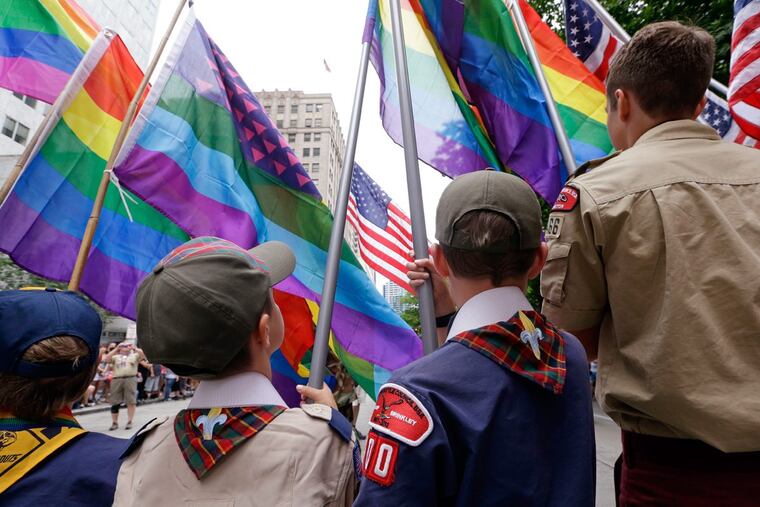Boy Scouts' latest move leaves atheists scratching their heads | Perspective
The Boy Scouts have opened up their membership in recent years to kids who are gay, transgender, and now female. But one group remains ostracized.

In 2012, I mailed my Eagle Scout badge back to Boy Scout headquarters.
Despite the fact I consider the time I spent as a Boy Scout among the most influential and positive experiences of my life, I couldn't stand behind an organization that banned gay Scouts and scoutmasters from serving. Since I severed my ties with the Scouts, the organization has come around to public sentiment regarding gay and transgender kids and adults, and on Wednesday announced another step forward: Girls will be allowed to join.
The organization itself admits that the move to allow girls isn't because of some progressive awakening; it's due to the fact that it's easier for busy parents to have all their kids in one group rather than dividing them (and their time) along gender lines. It's no secret the Boy Scouts have seen membership numbers decline as society changed around them, so allowing girls in is a transparent attempt to bolster their sagging numbers.
But if the Boy Scouts want to increase membership and/or be truly inclusive, there is another change to be made. One group still remains ostracized from benefiting from all the leadership skills the Boy Scouts have to offer: atheists and agnostics.
Maybe Boy Scout leaders are unaware that the number of kids unaffiliated with religion continues to rapidly increase in today's society.
Let's be clear: The Boy Scouts are within their rights to ban open nonbelievers as a private organization that has been backed for more than a century by the Mormon church. The Supreme Court upheld its right to limit membership as it sees fit. References to God and the necessity of being reverent are littered throughout Boy Scout literature, including new requirements added in 2015 that force Scouts earning a new rank to "tell how you have done your duty to God." In its own statement of religious principle, the organization "maintains that no member can grow into the best kind of citizen without recognizing an obligation to God."
But just because it's legal doesn't mean it's right.
I grew up in a family that wasn't religious and didn't go to church. My first exposure to religion came as a Cub Scout, when my pack (which met in a church) would pray before meals. At the time, I was too young to understand I was an atheist, so I just bowed my head respectfully and waited until the prayer was over.
Later, as a Boy Scout growing up in rural Oklahoma, the overt link between religion and the organization became more apparent, but I simply kept my personal beliefs to myself and was respectful of others. That seemed to fulfill the expectation of doing my duty to God, and it was a small sacrifice to make in order to spend my time building campfires, shooting weapons, and playing stickball.
Maybe I was just lucky to have understanding scoutmasters. When I was asked at my Eagle board of review about my reverence, I explained that while I'm not a religious person, I always viewed personal reverence — one of the 12 points of the Scout Law — as being respectful of others and their own beliefs.
I've heard of others who have expressed their nonreligious beliefs and, despite all the good they did during their tenure, were forced out and denied the Eagle Scout rank they'd earned.
To me, the Scouts' arcane view of nonbelievers does a disservice to the ultimate mission of a generally good organization, which is to instill values in young people and "prepare them to make ethical choices over their lifetime in achieving their full potential."
But is it ethical to teach young adults to judge the morality of their peers solely on the basis of their religious beliefs?
While it's nice that the Boy Scouts are letting in girls, the leaders could really learn a lesson from the Girl Scouts, which has been a secular organization since its founding, helping to mold the young minds of believers and nonbelievers alike. They also welcomed in gay and transgender kids years before the Boy Scouts gave in due to pressure on public sponsors.
So instead of busy parents enrolling their daughters to become a Tenderfoot, maybe they should ask the Girl Scouts if sons can become Brownies. In addition to offering a better moral compass, the cookies are delicious.